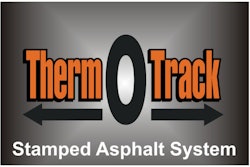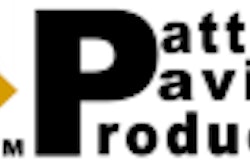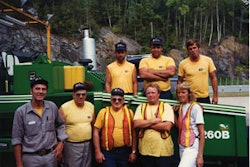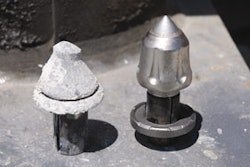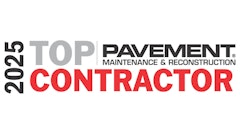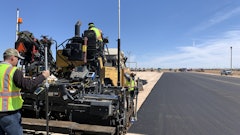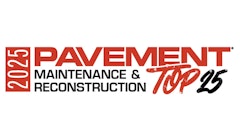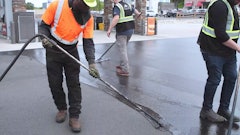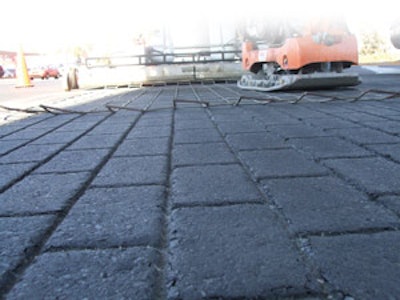
Decorative asphalt has been around the market for a while - about 15 years - but contractors and customers are just starting to take notice. Decorative asphalt includes stamped asphalt, thermoplastics, and epoxy and stone systems and coatings, says Gerry Oliver, president of Pattern Paving Products.
Decorative asphalt is really starting to take off in the paving industry. Oliver says a lot of people are using decorative asphalt to increase their property values. Greg Larson, owner and president of Thermotrack, sees the same situation. "A homeowner will invest in his property and always work to maintain the value of his investment," Larson says. Decorative asphalt offers a new avenue for homeowners to improve their properties.
Oliver and Larson agree that the contractor applicator base is getting larger and better when it comes to decorative asphalt. Because of this, Oliver says he is seeing decorative asphalt now being used on much larger projects. And, it is becoming more popular in the commercial market as well, he adds. "In the '90s we had to try to convince people that this is a product that is going to last." Now, customers are requesting it and it is being spec-ed into projects.
Larson says the economy is one of the factors driving so many contractors to add decorative asphalt services to their businesses. "A lot of pavement contractors who weren't into decorative have now gotten into it and promoted it. They're diversifying their company and adding to their portfolio," Larson says. Plus, they're adding another revenue source as well, which is important when other areas of the paving industry slow down.
The decorative asphalt industry hasn't been immune to the current economic situation either. However, it hasn't all been bad news.
"Where it's [decorative asphalt] affected on one side in a negative way, it's affected in another way by more people looking at it for a source of income," Oliver says. "Where you're losing a little on one side you're picking up with people interested in getting involved."
And because decorative asphalt is still fairly new to customers, contractors can still charge a premium price for the service. "Most of the time the customers feel that it's a fair price for the results they're getting," Larson says. In the future, as more contractors begin to offer decorative asphalt services, the increased competition might have an effect on prices. However, Larson says he still thinks contractors will be able to charge a premium for this work.
Both Larson and Oliver agree that the decorative asphalt industry has come a long way, especially the products. Coatings, for example, have evolved from acrylic products to epoxies, Larson says. "The epoxies have proven to have better adhesion and a more durable surface. The wearability and durability of the new epoxies is significantly better than what we've had in the past," Larson says. "These epoxies are impervious to chemicals where some of the acrylics would peel and bubble up."
"It's been a process of evolution," Larson adds. "As we go along we develop better methods and better products."
The decorative asphalt industry has plenty of room for growth. And looking into the future, that's just what it's going to do. Larson says that architects are starting to pick up on the idea and benefits of decorative asphalt and are beginning to spec it into more projects. This is where he sees the most growth and expansion for decorative asphalt.
But consumers are also becoming educated on the existence of decorative asphalt, Oliver adds. He says contractors will need to target and educate consumers who may be aware of stamped concrete but not stamped asphalt.
Oliver also says he sees the decorative asphalt market growing in the central part of the country. "Geographically, the East Coast and the West Coast are fairly strong as far as the amount of applicators. The central part is slower in bringing on new applicators," he says. He speculates that one reason for this is the smaller population base. However, Oliver says he expects to see manufacturers targeting the central part of the country more as decorative asphalt grows in that area.
There's no doubt that decorative asphalt has come a long way over the last 15 years. And despite being in the market for that time span, Oliver says the industry is still in its infancy. "It takes a while for construction products to be recognized," he says. "A 10-year-old construction product is not an old product, it's still relatively new."
And the versatility of decorative asphalt is also helping it grow. Larson points out that stamped asphalt is typically used just for an accent, but as the industry and consumer knowledge grows so do the sizes of projects. Now whole driveways and crosswalks are incorporating stamped or coated asphalt.
"For the first 10 years there were still a lot of skeptical people saying that if you put a pattern in asphalt it's not going to last," Oliver says about decorative asphalt. "That myth has been debunked. Now the paving and construction industries accept stamped asphalt as a viable product."




